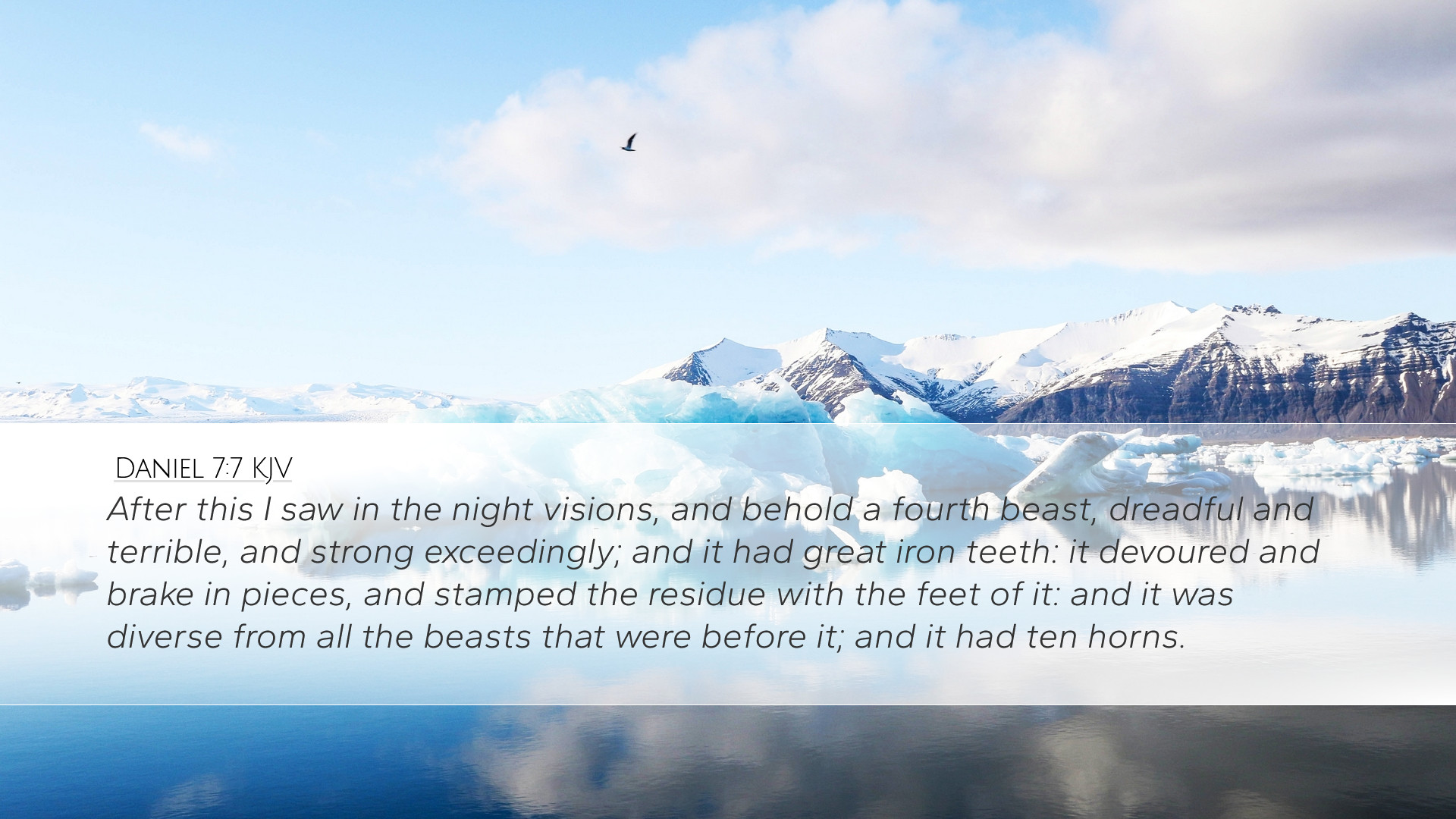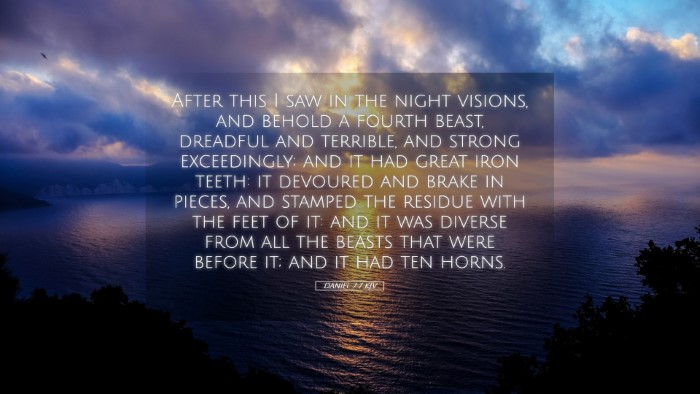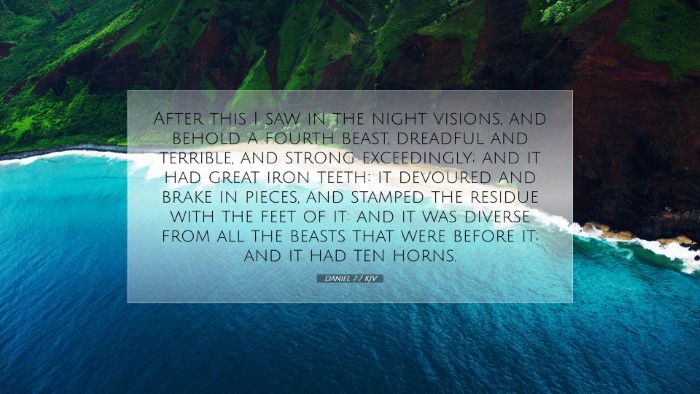Commentary on Daniel 7:7
Text of Daniel 7:7 (KJV): "After this I saw in the night visions, and behold a fourth beast, dreadful and terrible, and strong exceedingly; and it had great iron teeth: it devoured and brake in pieces, and stamped the residue with its feet: and it was diverse from all the beasts that were before it; and it had ten horns."
Introduction
The vision described in Daniel 7 is one of the foundational texts for understanding the prophetic literature of the Bible. This particular verse, Daniel 7:7, introduces a fourth beast that stands apart from the previous three, embodying both power and dread. In interpreting this symbol, scholars draw upon various commentaries to unearth rich theological insights pertinent to understanding the nature of this beast, its implications for the future, and its relevance to the audience of Daniel's time and beyond.
Overview of the Fourth Beast
In Daniel 7:7, Daniel introduces a vision of a beast that evinces a profound terror and strength. This beast is often interpreted as representing a significant kingdom or empire with characteristics that denote its brutal nature and harsh dominion.
Characteristics of the Beast
- Dreadful and Terrible: Matthew Henry emphasizes the fearsome nature of the fourth beast, reflecting the oppressive power of the kingdoms it symbolizes.
- Strong Exceedingly: This phrase denotes not only physical strength but also a metaphysical might; it signifies an entity capable of exerting influence, control, and enforcement over its subjects.
- Iron Teeth: Albert Barnes interprets the iron teeth as a symbol of destruction and power, indicative of the beast's ability to crush its enemies and dominate its surroundings.
- Devoured and Brake in Pieces: The verb choice here suggests a complete and utter conquest, illustrating the beast's ferocity in its endeavors to assert itself over other nations.
- Ten Horns: Adam Clarke notes the significance of the ten horns, often understood as representing ten kings or kingdoms within the broader context of prophecy, contributing to the beast's terrifying and oppressive rule.
Theological Implications
The fourth beast in Daniel 7:7 ultimately symbolizes oppressive regimes and rulers throughout history. Its description aligns with a broader theological theme in biblical prophecy that asserts God's sovereignty over nations and empires.
God's Sovereignty
Daniel’s vision of beasts serves as a reminder of God’s oversight, even as these violent empires rise to power. As noted in the writings of Matthew Henry, the terror and dread associated with the fourth beast do not ultimately undermine God's authority; rather, they highlight His ultimate control over history.
Transformation Through Judgment
The contexts of oppression indicated by the fourth beast ultimately lead towards God's judgment. The subsequent verses in Daniel 7 highlight the eternal kingdom that will be established by God following the disturbances wrought by such kingdoms, reiterating that despite their ferocity, they are not everlasting.
Historical Context
For pastors and scholars, an understanding of the historical implications is critical. Daniel wrote during a time of great distress for the Jewish people, and his visions represented hope amidst oppression. This fourth beast can be viewed as reflective of Babylonian, Medo-Persian, Greek, and Roman empires, with many commentators agreeing on its association with oppressive Gentile powers.
Reassurance to the Persecuted
Amidst the backdrop of such powerful empires, the faithful are reassured of God's ultimate domain over history. The insights from Albert Barnes reinforce the notion that this vision serves not only as a portrayal of terror but also as a comfort for those enduring persecution. It emphasizes that though one finds oneself under the threat of overwhelming power, God retains authority over all.
Contemporary Application
For modern-day theologians and students of Scripture, Daniel 7:7 invites reflection over the course of history and the nature of power. What can this beast symbolize in today’s geopolitical landscape?
Recognition of Modern 'Beasts'
Contemporary applications may point toward regimes that exhibit similar characteristics of oppression, authoritarianism, and brutality. The call for vigilance against such powers echoes Matthew Henry's reflections on the nature of tyrants throughout history and their inevitable downfall in light of divine justice.
Conclusion
Daniel 7:7 serves as a pivotal verse that encapsulates themes of power, oppression, divine sovereignty, and hope. It invites an ongoing dialogue among pastors, theologians, and Bible scholars regarding the nature of earthly power in light of eternal truths. Understanding this verse within the comprehensive narrative of Scripture reveals the character of God as sovereign and just, continually inviting believers to trust in His ultimate plan.


